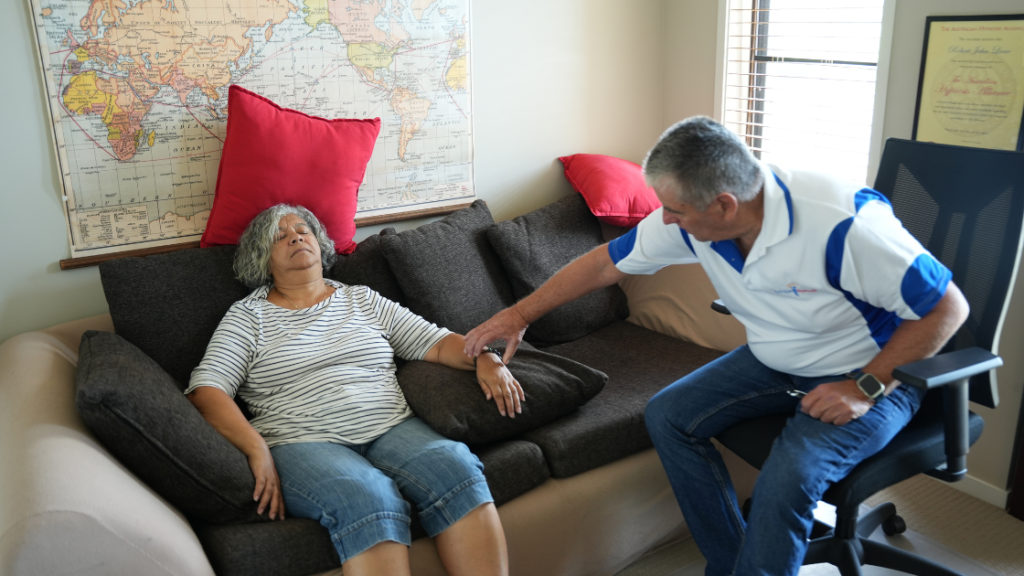Hello everyone, Bob Lane here. Through my extensive experience in hypnotherapy, I’ve witnessed firsthand the remarkable power of the mind in overcoming various health and personal challenges.
Today, I want to talk about a unique aspect of healing that often goes overlooked: the role of hypnosis in enhancing recovery post-surgery and improving quality of life in palliative care.
Whether you’re a patient, a caregiver, or simply someone interested in alternative healing methods, this discussion will open your eyes to the transformative potential of hypnotherapy.
We live in an age where medical advancements have significantly improved surgical outcomes and palliative care. However, the journey of recovery and managing life with a chronic illness can still be overwhelming.
Traditional medicine, while essential, sometimes falls short in addressing the psychological and emotional needs that arise during these challenging times. This is where hypnotherapy can make a profound difference, offering a holistic approach that complements conventional treatments and provides a pathway to a more comfortable, peaceful, and fulfilling life.
The Challenge: Post-Surgery Recovery and Palliative Care
Recovering from surgery can be a long and arduous process. The body needs time to heal, but often, the mind can get in the way. Anxiety, stress, and negative thoughts can impede recovery, making the journey back to health feel even longer.
Similarly, in palliative care, patients and their families face unique emotional and psychological challenges. The focus shifts from curing the illness to enhancing the quality of life, managing symptoms, and providing emotional support.
Why Traditional Methods Might Not Be Enough
While conventional medicine plays a critical role in surgery recovery and palliative care, it sometimes falls short in addressing the psychological and emotional aspects. Medications can manage pain and aid physical healing, but the mental and emotional side of recovery often requires a different approach.
This is where complementary therapies like hypnotherapy come into play, offering a holistic approach to recovery. Hypnotherapy can be particularly effective in managing pain, reducing anxiety, and fostering a positive mindset, which is crucial for healing.
The Power of Hypnotherapy in Healing
This is where hypnotherapy comes in. Hypnosis is a natural, safe, and effective way to engage with the subconscious mind, promoting healing, reducing stress, and altering perceptions of pain. It’s a tool that can complement traditional medical treatments, offering a holistic approach to recovery and care.
Hypnotherapy for Post-Surgery Recovery
After surgery, patients often experience pain, anxiety, and sometimes, a sense of hopelessness. Hypnotherapy can help by:
Managing Pain: Hypnosis can alter the way the brain perceives pain, helping to reduce reliance on pain medication and ease discomfort.
Reducing Anxiety and Stress: Hypnosis promotes relaxation and can help in releasing negative thoughts and fears associated with surgery and recovery.
Enhancing Healing: By fostering a positive mindset, hypnosis can actually speed up the physical healing process.
Hypnotherapy in Palliative Care
In palliative care, the focus is on comfort and quality of life. Hypnotherapy can be particularly beneficial in:
Managing Symptoms: Hypnosis can help in alleviating symptoms like pain, nausea, and insomnia, which are common in palliative care.
Emotional Support: It can provide emotional relief, helping patients and their families cope with feelings of fear, anxiety, and depression.
Improving Overall Well-being: Through relaxation and positive affirmations, hypnotherapy can enhance the sense of peace and well-being.
Real-Life Success Stories
In my practice, I’ve seen incredible transformations. Patients who struggled with post-surgery pain found relief through hypnotherapy. Those in palliative care experienced a significant improvement in their quality of life, feeling more at peace and less burdened by their symptoms.
How Hypnotherapy Works
Hypnotherapy works by guiding the individual into a deeply relaxed state, often referred to as a trance. In this state, the conscious mind becomes less active, allowing the subconscious mind to come to the forefront. The subconscious is where our deep-seated beliefs, habits, and emotions reside. By accessing this part of the mind, hypnotherapy can effectively address issues that are often beyond the reach of conscious thought and willpower.
During a hypnotherapy session, the therapist uses various techniques such as visualization, positive suggestions, and guided imagery to induce relaxation and focus. Once in a trance, individuals are more receptive to positive suggestions and new ideas. The therapist can then work with the client to replace negative beliefs and behaviours with healthier, more beneficial ones.
This process can help in managing pain, reducing anxiety, changing unhealthy habits, and improving overall emotional well-being. The specific techniques and approach used in hypnotherapy are tailored to the individual’s needs and goals, making it a highly personalized form of therapy.
Is Hypnotherapy Right for You?
Hypnotherapy is not a one-size-fits-all solution. It’s important to have an open mind and a willingness to engage in the process. If you’re recovering from surgery or seeking comfort in palliative care, hypnotherapy might be the missing piece in your journey to wellness.
Getting Started with Hypnotherapy
If you’re interested in exploring how hypnotherapy can assist in your recovery or enhance your quality of life in palliative care, I invite you to reach out. We can start with a no-obligation consultation to discuss your specific situation and determine how hypnotherapy can benefit you.
Whether you’re dealing with physical discomfort, emotional turmoil, or seeking a deeper sense of well-being, hypnotherapy can be a valuable ally on your journey. If you’re ready to explore the potential of your mind in your healing process, I’m here to guide you.
Together, we can unlock the doors to a healthier, happier life, where the challenges of recovery and care become stepping stones to personal growth and inner peace.
In conclusion, the journey of recovery and care doesn’t have to be a struggle. With the aid of hypnotherapy, you can unlock the power of your mind, accelerate your healing, and enhance your overall quality of life. Remember, the mind is a powerful ally in your health journey.
Let’s work together to tap into its potential and pave the way for a more comfortable, peaceful, and fulfilling life.




